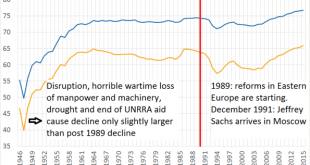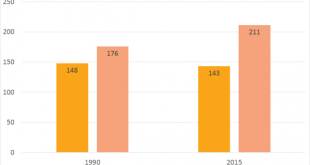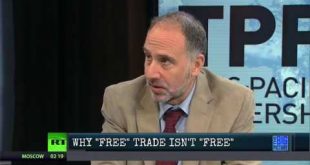During the first Putin presidency, the Russian government gave a very high priority to paying back Russian international debt and used quite a lot of the income from oil to do this. Jeffrey Sachs answers why (also read the last paragraph): The lack of Western assistance The lack of Western assistance was grim and was my greatest frustration[32] during late 1991 and 1992. The early days were inauspicious to say the least. When the G-7 deputies came to Moscow in late November 1991, just...
Read More »The editor has gone to Zanzibar
For the first time since 1964 Russian male life expectancy reached a new record
For a kind of prediction of the 1947 mortality crisis you will find a march 1947 article by Ernest Germain published by the fourth international here (I love the internet). Basically, the exhaustion of war time stocks (during the war partly provided by the 1943 United Nations Relief and Rehabiliation Administration), the horrible losses of people manpower suffered during the war, the dislocation and loss of production capacity caused by the war and a terrible drought in 1946 caused a...
Read More »Where did all the Ukrainian refugees go…?
The population of Russia is growing again – because Russia accepts millions of Ukrainian refugees. Russia is supposed to be a world-class bully again – but if so (and it is indeed making things in Syria even more vicious than ‘we’ already did…) it is clearly playing outside its league. It is a country with a dwindling population and a dwindling GDP. But while preparing the graph above, I wondered why, after the post 1990 demographic catastrophe (look here for a The Lancet article about...
Read More »How Globalism is Rigged To Make the Rich Richer w/Dean Baker
The Big Picture Interview w/Dean Baker, Center for Economic and Policy Research (C.E.P.R.)/Rigged: How Globalization and the Rules of the Modern Economy Were Structured to Make the Rich Richer. President Obama is gearing up for a big lame-duck session fight for the Trans-Pacific Partnership. Supporters and opponents of this deal call it "free trade" - are they both wrong? For more information on the stories we've covered visit our websites at thomhartmann.com - freespeech.org - and RT.com....
Read More »Wages not commensurate with labor productivity in the USA
Since 1975 workers have received almost none of the gains of increased productivity, which has increased by 143% since around 1975 (figure 14). In other words, productivity has more than doubled, while workers received none of the gains. This can be explained by the deindustrialization of the US economy, as heavy industries followed by manufacturing in general were exported to Asia. Due to this trend there was a huge decrease in unionization which went from 39% in 1940 to around 10% in...
Read More »The oddity of a Brexit odyssey
By Jamie Morgan Globalizations is a leading inter-disciplinary journal with an interest in political economy. It has notably published on exploitative work practices, the Arab Spring, land grabs, climate change, and the power asymmetries and future prospects of governance processes. The journal recently organized a special forum on Brexit. The forum includes contributions from many points of view: British history, the history of European integration, the role of class, the rise of the...
Read More »Inequality as policy: selective trade protectionism favors higher earners
from Dean Baker Globalization and technology are routinely cited as drivers of inequality over the last four decades. While the relative importance of these causes is disputed, both are often viewed as natural and inevitable products of the working of the economy, rather than as the outcomes of deliberate policy. In fact, both the course of globalization and the distribution of rewards from technological innovation are very much the result of policy. Insofar as they have led to greater...
Read More »Michel Foucault: Power/Knowledge
from Asad Zaman We cannot understand the world around us without a sophisticated understanding of the complex but intimate relationship between knowledge and power. One of the most influential philosophers of the twentieth century, Michel Foucault, crafted a radically different understanding of this relationship. Instead of seeing power in brute force, he saw power as being the ability to shape knowledge. To understand Foucault, we must let go of our comfortable and conventional...
Read More »Can the Venezuelan economy be fixed?
from Mark Weisbrot The international media has provided a constant fusillade of stories and editorials (not always easily distinguished from each other) about the collapse of the Venezuelan economy for some time now. Shortages of food and medicine, hours-long lines for basic goods, incomes eroded by triple-digit inflation, and even food riots have dominated press reports. The conventional wisdom has a set of predictable narratives to explain the current economic mess. “Socialism” has...
Read More » Real-World Economics Review
Real-World Economics Review




